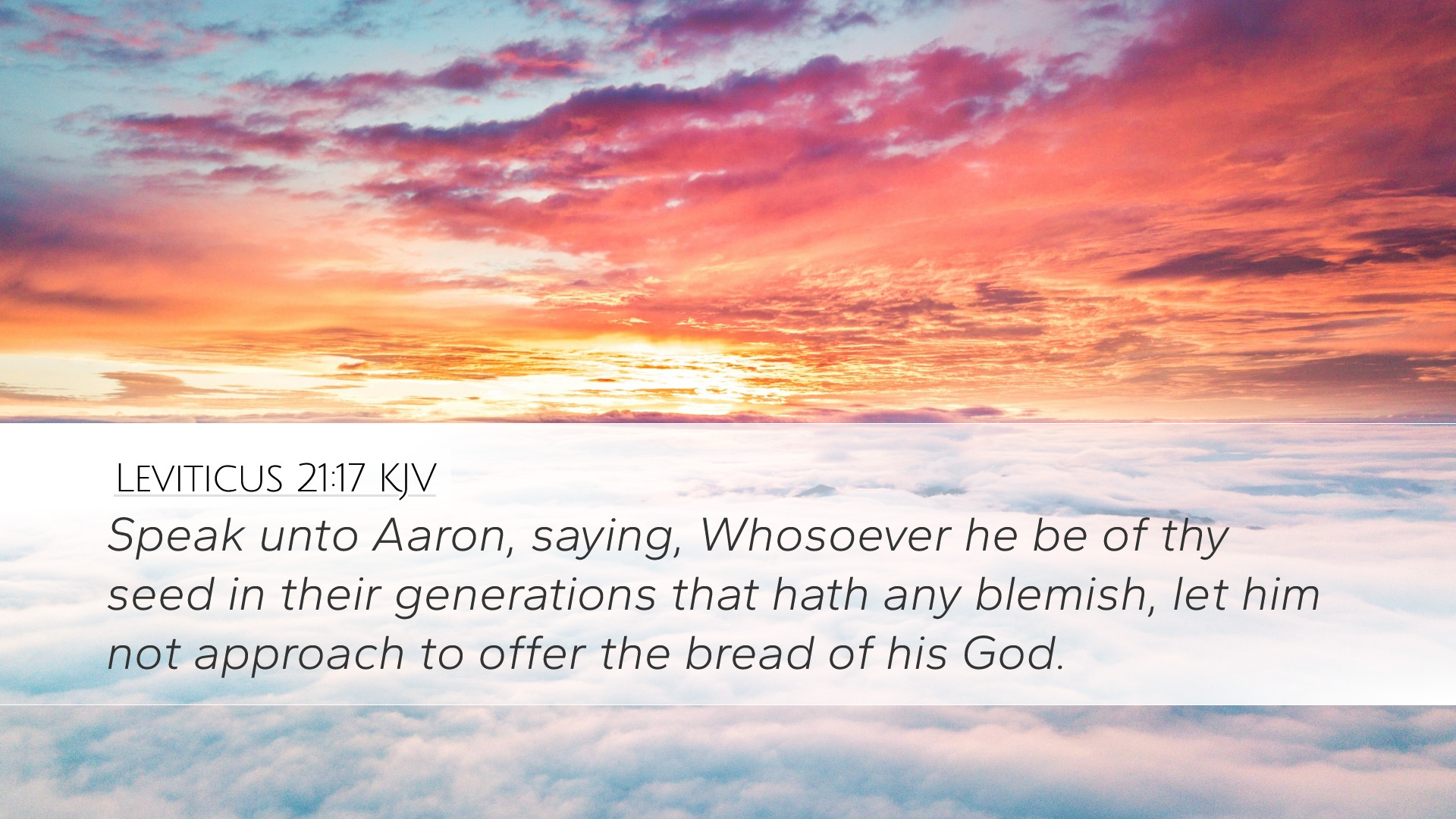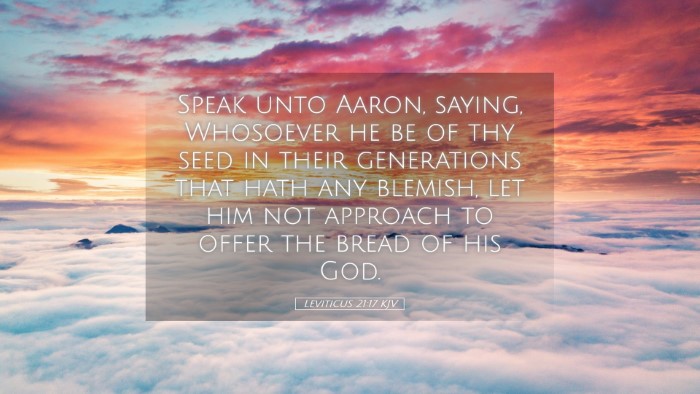Commentary on Leviticus 21:17
Leviticus 21:17 states: "Speak unto Aaron, saying, Whosoever he be of thy seed in their generations that hath any blemish, let him not approach to offer the bread of his God." This verse is part of the larger context of the holiness code, which outlines the standards for the priests of Israel.
Context and Significance
The priestly laws found in Leviticus function to maintain the sanctity of the priesthood. Aaron and his descendants were set apart to serve before the Lord in the tabernacle and later in the temple. As these priests made offerings and interceded for the people, their fitness for service was vital. Any physical imperfection or blemish could symbolize not only a physical defect but also a potential spiritual unfitness.
Insights from Matthew Henry
Matthew Henry emphasizes the intrinsic connection between the physical and spiritual realms. He notes that the requirement for priests to be without blemish reflects God's desire for holiness among those who minister before Him. Henry asserts that this not only pertains to outward appearance but also to the heart's condition before God. He writes:
"The priests being appointed to offer bread to God, must be free from all blemish, for God will not have His worship profaned by those that are unfit and unholy."
Insights from Albert Barnes
Albert Barnes comments on the specifics of what constitutes a "blemish." He explains that the Hebrew word used can refer to various physical defects or incapacities that would disqualify an individual from performing sacred duties. Barnes correlates this with the idea of purity, emphasizing that:
"The inherent holiness of God requires a corresponding holiness in those who draw near to Him. The sacred duties of the priesthood necessitate a life exemplifying purity and cleanness."
Furthermore, he highlights the broader implication of this directive, suggesting that a priest’s unblemished status symbolizes the need for believers to strive for purity in their spiritual lives.
Insights from Adam Clarke
Adam Clarke delves into the nuances of the term "blemish." He states that in ancient Israel, being blemished was not merely about individual flaws but also about the communal representation in the priestly role. Clarke asserts:
"Every aspect of the priest's life was to convey the glory of God, thus any defect could serve as a disappointment and dishonor to the divine expectations surrounding sacrificial offerings."
Clarke also provides a pastoral perspective, illustrating how these standards can be applied today. He encourages a deeper reflection on how leaders in the church should exemplify the character of Christ, as imperfections in leadership can lead to a distrust of divine truths.
Theological Implications
These insights culminate in several theological implications:
- Call to Holiness: There is an ongoing call for holiness in the lives of those who lead in spiritual matters (1 Peter 1:16).
- Christological Reflection: Understanding this verse in light of Christ, who is the ultimate High Priest without blemish (Hebrews 7:26), elevates our comprehension of holiness and acceptance before God.
- Pastoral Responsibility: Church leaders are challenged to maintain moral integrity, as their lives reflect the community’s understanding of God.
Application for Today
For pastors, students, theologians, and Bible scholars, Leviticus 21:17 serves as a necessary reminder of the ethical and moral standards expected of leaders. It compels a self-examination in light of God's holiness:
- Are leaders exemplifying spiritual health that aligns with God’s expectations?
- In what ways can the church today ensure a focus on holiness in its ministries?
- How does one navigate the balance between human imperfections and the call to represent Christ faithfully?
Conclusion
In closing, the command found in Leviticus 21:17 highlights the seriousness of priestly duties and their implications. The blend of insights from Matthew Henry, Albert Barnes, and Adam Clarke leads us to understand that not only the physical characteristics of a priest were under scrutiny but the spiritual and moral states as well. As followers of Christ are called to be a royal priesthood (1 Peter 2:9), the essence of this message remains profoundly relevant today.


